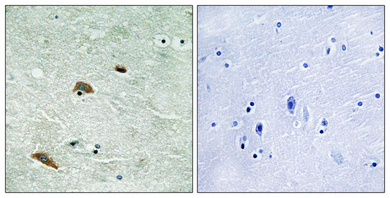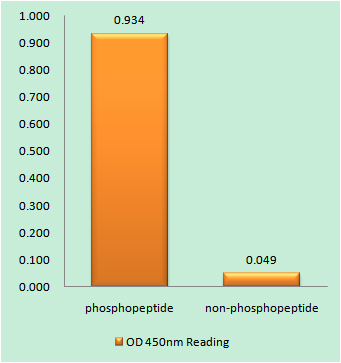TTK (phospho Thr676) Polyclonal Antibody
- Catalog No.:YP1062
- Applications:IHC;IF;ELISA
- Reactivity:Human;Mouse
- Target:
- TTK
- Fields:
- >>Cell cycle
- Gene Name:
- TTK
- Protein Name:
- Dual specificity protein kinase TTK
- Human Gene Id:
- 7272
- Human Swiss Prot No:
- P33981
- Mouse Swiss Prot No:
- P35761
- Immunogen:
- The antiserum was produced against synthesized peptide derived from human TTK around the phosphorylation site of Thr676. AA range:642-691
- Specificity:
- Phospho-TTK (T676) Polyclonal Antibody detects endogenous levels of TTK protein only when phosphorylated at T676.
- Formulation:
- Liquid in PBS containing 50% glycerol, 0.5% BSA and 0.02% sodium azide.
- Source:
- Polyclonal, Rabbit,IgG
- Dilution:
- IHC 1:100 - 1:300. ELISA: 1:20000.. IF 1:50-200
- Purification:
- The antibody was affinity-purified from rabbit antiserum by affinity-chromatography using epitope-specific immunogen.
- Concentration:
- 1 mg/ml
- Storage Stability:
- -15°C to -25°C/1 year(Do not lower than -25°C)
- Other Name:
- TTK;MPS1;MPS1L1;Dual specificity protein kinase TTK;Phosphotyrosine picked threonine-protein kinase;PYT
- Molecular Weight(Da):
- 97kD
- Background:
- TTK protein kinase(TTK) Homo sapiens This gene encodes a dual specificity protein kinase with the ability to phosphorylate tyrosine, serine and threonine. Associated with cell proliferation, this protein is essential for chromosome alignment at the centromere during mitosis and is required for centrosome duplication. It has been found to be a critical mitotic checkpoint protein for accurate segregation of chromosomes during mitosis. Tumorigenesis may occur when this protein fails to degrade and produces excess centrosomes resulting in aberrant mitotic spindles. Alternative splicing results in multiple transcript variants. [provided by RefSeq, Nov 2009],
- Function:
- catalytic activity:ATP + a protein = ADP + a phosphoprotein.,function:Phosphorylates proteins on serine, threonine, and tyrosine. Probably associated with cell proliferation.,similarity:Belongs to the protein kinase superfamily.,similarity:Belongs to the protein kinase superfamily. Ser/Thr protein kinase family.,similarity:Contains 1 protein kinase domain.,tissue specificity:Present in rapidly proliferating cell lines.,
- Subcellular Location:
- kinetochore,cytoplasm,spindle,membrane,
- Expression:
- Present in rapidly proliferating cell lines.
- June 19-2018
- WESTERN IMMUNOBLOTTING PROTOCOL
- June 19-2018
- IMMUNOHISTOCHEMISTRY-PARAFFIN PROTOCOL
- June 19-2018
- IMMUNOFLUORESCENCE PROTOCOL
- September 08-2020
- FLOW-CYTOMEYRT-PROTOCOL
- May 20-2022
- Cell-Based ELISA│解您多样本WB检测之困扰
- July 13-2018
- CELL-BASED-ELISA-PROTOCOL-FOR-ACETYL-PROTEIN
- July 13-2018
- CELL-BASED-ELISA-PROTOCOL-FOR-PHOSPHO-PROTEIN
- July 13-2018
- Antibody-FAQs
- Products Images

- Immunohistochemical analysis of paraffin-embedded Human brain. Antibody was diluted at 1:100(4° overnight). High-pressure and temperature Tris-EDTA,pH8.0 was used for antigen retrieval. Negetive contrl (right) obtaned from antibody was pre-absorbed by immunogen peptide.

- Enzyme-Linked Immunosorbent Assay (Phospho-ELISA) for Immunogen Phosphopeptide (Phospho-left) and Non-Phosphopeptide (Phospho-right), using TTK (Phospho-Thr676) Antibody


